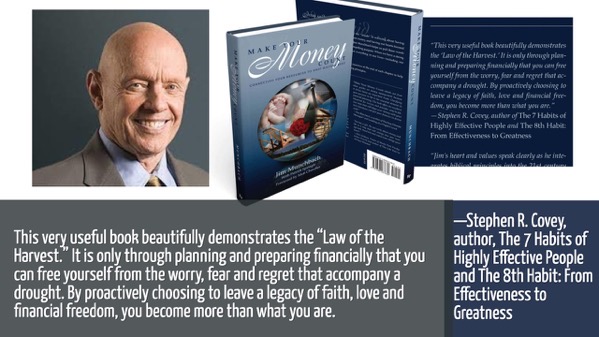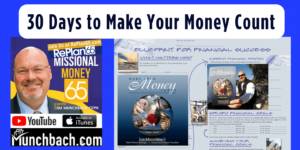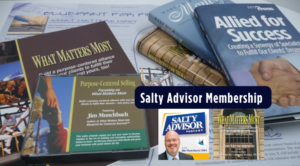Make Your Money Count Introduction
“Ninety-eight percent of us will die at some point in our lives, so a little planning can go a long way.” —Ricky Bobby, Talladega Nights
The Wedding Planner
I could see it on their faces and hear it in their voices. The difference was startling. Two couples, both clients of mine, had daughters who were getting married, but that’s where the similarities stopped.
Chris and Robin wanted a nice wedding for their daughter Melissa, but Chris hadn’t saved a dime since he started working after graduate school. He always figured “things would work out,” and someone—his parents, his employer, or the lottery jackpot—would provide any money he and his family needed.
But now, wedding plans were in full swing, and he had no money to pay for it. Money, or rather the lack of it, consumed him and his relationships with his wife and daughter. Over and over again, Robin and Melissa made plans, but when they presented them to Chris, he grimaced, shook his head, and then exploded, “You know we can’t afford that! What are you thinking?” Chris contacted me to ask for advice about managing his money, but in fact, he had no money to manage. The family had spent all they made every month since Chris and Robin got married, so there simply wasn’t any money to pay for the wedding. As the reality of his past choices hit him in the face, Chris felt ashamed and humiliated because he wasn’t able to provide for his dear daughter’s needs. In a short time, his discouragement slipped into depression, and he felt completely hopeless, helpless, and worthless. Still, the wedding plans had to be made, and the stress between Chris and Robin robbed the family of the joy of Melissa’s wedding. Eventually, Chris borrowed enough money to have a very modest ceremony, but the damage was done. Every moment and every decision was dominated by the painful lack of money, so relationships were strained. They endured, rather than celebrated, Melissa’s wedding. My other clients, Phil and Trish, had saved plenty of money for their daughter’s wedding. No, they hadn’t saved enough for swans, skywriters, and chateaubriand for 400, but they had enough for a beautiful wedding. Phil told me that a wonderful moment came early in the planning when his daughter Alicia asked, “Dad, what’s our budget for the wedding?”
Phil answered with a question of his own, “How much were you thinking of?” She gave him a number, and he replied, “You can add more to that. We have enough, and I want this to be a wonderful, beautiful day for you.”
Imagine what that did for Alicia’s sense of peace as she planned the wedding—and for her relationship with her dad!
I talked to Phil a number of times as the weeks wound down to the wedding, and each time, he told me some thing like, “Every day, I thank God that we have enough money to provide for Alicia’s wedding. That takes such a load off. We’re having a blast!” Phil’s family had some decisions to make, and of course, some of the choices were difficult ones. Should they allocate more money for a photographer and less for flowers, or the other way around? But the difficulty of those decisions pales in comparison to the shame, anger, and anxiety Chris, Robin, and Melissa experienced. When Alicia’s day arrived, it was a beautiful thing to see. Everybody was completely relaxed and focused on the joy of the moment, with no hint of anxiety about money. Phil told me, “Alicia’s wedding was beautiful, fun, and meaningful. In fact, it was glorious!” Phil and Trish had been intentional about managing their money, and they experienced incredible benefits from their plan.
The Emotional Nature of Money
Money may seem inert, but it has the power to cripple or heal, to depress or inspire. Dr. Laurence Barton, the President and Chief Executive Officer of the American College, observed, “Money is tangible, but it is also emotional in nature. It is necessary for the exchange of goods and services, but is also what divides spouses and families and is often the source of permanent scars among loved ones. . . . Interestingly enough, many individuals spend more time analyzing the sports scores or their horoscope in the daily newspaper than they invest in monitoring their daily financial health.” *[From the Foreword of What Matters Most by Jim Munchbach (Baxter Press, Friendswood, Texas, 2004), p. 9.]
A recent study concluded that most decisions about money are emotional, not rational, decisions. We are inundated by countless messages that we simply have to have this product or that service to make us happy, successful, and accepted, but we don’t hear many messages about the benefits of saving and investing.
So we buy . . . hoping that this time our purchase will make us feel really good, but with a nagging sense of guilt and anxiety that we’ll have to pay for it in another month. In a think tank sponsored by the National Endowment for Financial Education, a participant noted that most Americans now own things that only the wealthy would have enjoyed a few decades ago. But we’re not paying for these things with cash—we’re a credit society. He observed, “I think a lot of middle-income Americans are living their dreams. They’re driving vehicles they can’t afford and they’re living in houses they can’t afford. They have all the trappings. They’re focused on what makes them happy today.” *[“Motivating Americans to Develop Constructive Financial Behaviors,” by the National Endowment for Financial Education, 2004, p. 6.] But other messages can touch our emotions—if they can only be heard. These are messages about the peace and contentment of knowing our finances are on track to meet our family’s needs, and the unvarnished thrill of using our resources to touch the lives of others. The first step, though, is to establish or clarify a sense of direction, a purpose for our lives.
Connecting the Dots
In relation to our finances, the path to peace and fulfillment is connecting our resources to what matters most to us.Many people, however, have never clearly articulated what really matters to them. When they do, incredible things happen.
Soon after I finished my training as a CERTIFIED FINANCIALPLANNER™ professional, I met with a wealthy businessman. James grew up in a poor black neighborhood, and his family barely made ends meet day after day.
As an adult, James was driven to make enough money so that his own family never experienced the fear of empty cupboards, and he made a lot of money.James had over a million dollars in his retirement account, and his half-million dollar home was completely paid for. Clearly, he had plenty of resources, but he lived with constant anxiety that he might not be able to provide enough for his family. No amount of money seemed to be enough to calm his anxious heart, so he drove himself day after day to make more sales.
Before James and his wife Sheila walked into my office, his goal had been to make as much money as possible to be sure his family wasn’t in need. As we talked about his values, it became clear to him that his real purpose wasn’t making a lot of money. It was stability and security for his family, and he wanted to feel a sense of peace about his role as their provider.
We identified the goals that would fulfill his purpose,including the amounts of money required for his children’s education, his daughter’s wedding, and his retirement. We then outlined a plan so that all of these needs would be met. With the pressure to make more and more money off his back, he realized he would be able to spend far more time with his wife, his children, and his grandchildren.
Before that moment, James had been so driven to make money, but now he had a clear vision for his life and the freedom to enjoy quality time with his family.
In only a few minutes, the expression on James’ face changed entirely. Suddenly, he broke into a huge grin, and then he looked at his wife. They reached out to hold hands and looked into each other’s eyes as if to say, “This is what we’ve been looking for.” Their anxiety—and the tension it had created between them—had evaporated. They had come into my office confused and stressed, but they walked out with a profound sense of contentment and joy because they now looked forward to a future of rich, meaningful relationships.James was a new man with an achievable plan and the warm affirmation of his wife for being such a wonderful provider.
I’d like to take a lot of credit for the change in James’ life that day, but all I did was ask a few questions to clarify his goals and connect the dots between his resources and what mattered most to him.
Turning Point
Not long after Connie and I got married, we moved to Austin, Texas, and I got a job making more money than I ever dreamed of making. It wasn’t that much, but to me,it seemed like a fortune! I was able to buy things Connie and I could enjoy, and for a while, it was wonderful. I sure didn’t want to go into debt,but we spent every dime I made. Soon, though, the things I bought weren’t enough to thrill me any longer. I wanted more. I thought I needed more. I hoped the things I was buying could fill up the hole in my heart, but when they didn’t, I tried to cram more in there. But the hole just got bigger.
One day I realized that I had all I’d ever wanted—a wonderful wife, two beautiful sons, a good job, and lots of stuff—but I was miserable.My dream was fulfilled, but I felt emptier than ever. For a new thrill, I started smoking pot.That felt good for a while, but bad decisions followed bad decisions, and soon I was on the verge of losing Connie, my sons, my home, and my job. I’d like to say that I flushed my last dime bag down the toilet because of noble reasons, but that’s not true. I flushed it because I realized it was costing me way too much money.
The answer, I became convinced, was to make even more money. I left my job and became a State Farm agent. In that role, I interacted with hundreds of people, and I observed them carefully. Some were just as driven to make money as I was, and they felt just as empty. But surprisingly, many of the men and women who came to my office had a clear, compelling sense of direction for their lives, and they wanted to marshal every resource to fulfill their dreams. These people had learned one of life’s most important lessons: We experience far more joy and fulfillment if we devote ourselves to others instead of spending our resources on our own pleasures.
I had read about these principles of “giving to live” in some Bible classes in college, but these clients were flesh and blood examples who were living those principles. I desperately wanted what they had, but I wasn’t sure how to get it.
One major turning point came when I signed up for the Financial Planning Association Residency Program.
I went to the conference center a day early to spend time with some friends. That morning, I walked down to the restaurant to get some coffee, and I saw a man in his 50s coming out of the exercise room. He was the epitome of a handsome, fit, fabulously successful, got-it-all-together businessman. Instantly, I hated him. Our eyes met for a second, and we smiled and nodded to each other the way polite businessmen do. I hoped I would never see him again.
That afternoon, I walked in to the first meeting of the Residency Program,and there he was. He introduced himself, “Hello, my name is Rich.” I hoped to avoid him as much as possible, but he was one of my mentors for the entire week. A few minutes later, all the mentors were asked to give thumbnail sketches of their business philosophies and how they serve their clients. When Rich’s turn came, he told the group that he hoped to impart to us how much he treasures his clients. “My clients,” he told us, “are more than account numbers and sources of commissions. They are people who entrust their hopes and dreams to me.” He assured us that what matters most is not how much we know investments, tax law, or retirement planning, and it’s not how well we’ve perfected a particular set of sales techniques to get them to say “yes.” It’s about the people themselves.
Sacred Trust
Our calling, he said, is amazingly simple and immensely profound: to connect with people on the deepest level to earn their trust so they will share with us their dreams for their families and themselves. Instead of focusing on our own goal of getting them to buy a policy or invest some money so we can earn a commission, the focus shifts dramatically to their needs, their hopes, and their deepest desires. At the end of Rich’s introduction, he spoke a sentence that has resonated in my heart since that moment:“When clients share their most heartfelt dreams with me, I consider that a sacred trust.
”Immediately, I realized: That’s it! That’s what I’ve been looking for:relationships based on trust that surface and enhance our most cherished dreams. That’s what my clients wanted, but that’s what I wanted, too. I had been completely absorbed in myself—my pleasure, my goals, my desires, my success,and my comfort. The circle of my life had been reduced to a dot. As a friend of mine says about his temptation to be preoccupied with himself, “I may not be much, but I’m all I think about.” That was true of me—in spades! When I met with clients, I smiled and tried to look like I was genuinely interested in them,but I was thinking only about selling them products so I could make more money. And in my family, I demanded that they comply with my wishes all day,every day—or I pouted.
But Rich and the clients who had modeled a life of purpose were showing me that real life comes from looking beyond ourselves. I remembered that Jesus told his followers, “Give away your life; you’ll find life given back, but not merely given back—given back with bonus and blessing. Giving, not getting, is the way. Generosity begets generosity” (Luke 6:38). I’d probably read or heard that passage dozens of times, but in Rich and my purpose-filled clients, I saw that it’s true. Those who lived for a higher purpose than their own pleasure experienced the thrill of touching others’ lives and the contentment of knowing their lives really count.
The change in my life has been wonderful . . . if a bit uneven. As I’ve become convinced that living for others brings the most joy in life, I’ve certainly experienced far greater contentment than ever before. Instead of demanding my way all the time with Connie and our kids (and my friends and co-workers and neighbors and anyone else in the universe), I really care about them. Instead of using Connie to meet my needs, I’m more concerned about her needs. Believe it or not, I’m learning to listen. Today,I see my defect of selfishness far more clearly than I did when I was submerged in it, and now I can more easily identify my selfish attitudes and actions so I can make choices to be more gracious and grateful. But make no mistake, I’m still in process, and I have a long way to go.I’m only on the first part of the path, but I’ll tell you, even the beginning of the journey of caring for others is far better than the best day of rampant selfishness.
Who is Make Your Money Count for?
Everybody, All the Time
Many books about financial management focus almost exclusively on those who are deeply in debt. That’s a significant audience, but the financial principles that bring fulfillment and adventure apply to all of us. Getting out of debt brings tremendous relief, but connecting our resources to what matters most produces a delicious blend of contentment and excitement. I believe that’s what most of us long for.
The message of this book is for three distinct audiences: those in their 20sand 30s, who are just starting out and facing new responsibilities, those in their 40s and 50s, who are in their most productive years, and those in their 60s and above, who live with either great joy or regret because of past choices. Let me describe these audiences a bit more.
• 20s and 30s
I talk to a lot of young singles and couples who realize that their new responsibilities of work, marriage, children, and a home require them to learn to manage their money. Just out of college, many of them spent every penny they made on clothes, cars, ski trips, and anything else their friends were doing. But now, they want to get serious about their finances, and they’re looking for some good advice.
• 40s and 50s
Many people in their 40s and 50s have settled into habits that are established—and maybe as hard as concrete. They’ve found a peer group they want to run with, and they have determined that they need to spend a certain amount of money to be accepted by them. In some cases, these habits include sound financial management, but often, these habits are monsters that need to be fed with more and more money. They’re making a lot of money, but they’re spending virtually all of it.
Others in this stage of life have a lot of money in home equity and in various investment and retirement accounts, but their finances leave them with a mysterious sense of emptiness. Beyond a comfortable retirement, they aren’t sure what their money is for.
Some in this stage have only a modest amount of money in retirement accounts, but not nearly enough to provide the security their families need.Unless things change, they know they’ll need to work until the day they die.
• Over 60
Older people who come to my office seem to be full of either hope or despair. In most cases, their best income-producing years are over, and they look back on their decisions with either thankfulness or regret. Important lessons,however, are learned either way, so they still have a wonderful opportunity to impart wisdom to their children and grandchildren and leave a strong legacy.
Vision, Intention, and Means
A Very Personal Journey. In my own life and in the lives of countless people I’ve counseled, I’ve realized that change happens most readily and permanently if people have a clear picture of the future, a commitment to take steps of progress, and good handles on the steps they need to take. Elements of change, then, are vision,intention, and means.
This book is structured with these three features in mind:
Clarifying Your Vision, Values, and Purpose
The first three chapters focus on creating or clarifying our vision or our purpose in life.
As we got though those chapters, some people may think,Why is he taking so long to get to the nuts and bolts of budgeting and investing? The reason is that these three chapters are essential to give us direction and motivation for the choices we make in the rest of the book.
The Blueprint for Financial Success™
Chapter 4 takes us through “The Blueprint for Financial Success.”
The analysis we do in this step stimulates our intention to make the changes we need to make.
The rest of the book, chapters 5 through 8, describes the principles and resources we can use to achieve the goals we set in the Blueprint.
Small Steps, Big Payoffs
Whatever you do, don’t miss Chapter 6, “Small Steps, Big Payoffs.” This chapter shows how seemingly insignificant choices in our daily lives make a huge difference in our financial security and opportunities down the road. For example, our choice of cars—choosing one with a $200 monthly payment insteadof one with a $400 payment—can save us enough money to net over $1,000,000when we’re 65! Stay tuned. You don’t want to miss that chapter.
Self-Discovery
I make no assumptions about what your purpose in life is or should be.The self-discovery you’ll experience in these pages will clarify your life’s purpose so you can connect everything you have and everything you do to what matters most to you. As I explained the content of the book to a friend of mine, he gave a half smile and shook his head. He told me, “Yeah, but most of the financial planning books that are written by Christians have the subtle—or not so subtle—intention of getting people to donate their money to the church’s building fund.Is that your angle, too?”
No, I told him, that’s not even on my radar. I hope people will think,dream, and plan so they accomplish something that gives them personal fulfillment. That “something” certainly involves their family’s security, but it may also involve serving people in need through a host of organizations:Amnesty International, their church, Habitat for Humanity, or any of dozens of other groups that are trying to make a difference in people’s lives.
As you’ve probably guessed, I’m a follower of Christ, so my own purpose in life is shaped to a large degree by my understanding of God’s desires for me and every other person who follows him. The most powerful motivation I’ve known is the deep sense of gratitude that comes from experiencing the unconditional love and acceptance of Jesus Christ. Knowing his love and acceptance is by far the most incredible experience of my life. But in my work as a financial planner, I meet with Hindus, Buddhists, Muslims, agnostics, atheists,Jewish people, and others from every kind of religious stripe. Most of the principles of spending, saving, investing, and giving transcend all religions. We can apply them no matter what we believe about God. My faith, though, directs me to look beyond my own needs and try to help others.
My hope is that this book will give you a few “Aha!” moments when alight comes on and you realize a truth or an opportunity you’d missed before.Those moments inevitably lead to choices to move in a new direction (or go back to a previously beaten path). As you clarify your purpose and connect your resources to what you really value, I believe you’ll feel relief and contentment,and you’ll celebrate knowing your life counts for something much bigger than yourself.
What Matters Most
The process of connecting our resources to what matters most is exhilarating, but sometimes, it’s not easy.In this book, I’m going to ask you to look at some aspects of your life—your heart and your money—as if you’d never seen them before.Have courage. It’s worth the trouble!
At the end of this introduction and each chapter, you’ll find some exercises and reflection questions. When I read books, I get far more out of them if I take a little more time to wrestle with the issues the author presents. These exercises and questions are designed to help you gain insights about your own motivations, perceptions, and goals. I hope you enjoy working through them.And by the way, they stimulate rich discussions with your family and friends, or in a class or small group. These sections are in two parts: “Think about it…” and “Going deeper.”
The first is designed to help you reflect on the connection between your purpose and your finances, and the second part specifically addresses Christian values for those of you who want to follow Christ in everything you do, including how you manage money.
Think about it…
1.Now that you know what this book is about, what do you want to happen in your life as a result of reading and studying it? (Consider your purpose in life, your closest relationships, your habits of managing money, and your future.)
Going deeper
1.Read Luke 6:38 again, and describe what that abundance might look like with regard to your relationship with God, your relationships with others,and your generosity with your time and other resources.
What is Jesus’ promise to us in this passage?






